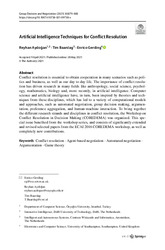Artificial intelligence techniques for conflict resolution
| dc.contributor.author | Aydoğan, Reyhan | |
| dc.contributor.author | Baarslag, T. | |
| dc.contributor.author | Gerding, E. | |
| dc.date.accessioned | 2023-04-06T05:16:05Z | |
| dc.date.available | 2023-04-06T05:16:05Z | |
| dc.date.issued | 2021-08 | |
| dc.identifier.issn | 0926-2644 | en_US |
| dc.identifier.uri | http://hdl.handle.net/10679/8109 | |
| dc.identifier.uri | https://link.springer.com/article/10.1007/s10726-021-09738-x | |
| dc.description.abstract | Conflict resolution is essential to obtain cooperation in many scenarios such as politics and business, as well as our day to day life. The importance of conflict resolution has driven research in many fields like anthropology, social science, psychology, mathematics, biology and, more recently, in artificial intelligence. Computer science and artificial intelligence have, in turn, been inspired by theories and techniques from these disciplines, which has led to a variety of computational models and approaches, such as automated negotiation, group decision making, argumentation, preference aggregation, and human-machine interaction. To bring together the different research strands and disciplines in conflict resolution, the Workshop on Conflict Resolution in Decision Making (COREDEMA) was organized. This special issue benefited from the workshop series, and consists of significantly extended and revised selected papers from the ECAI 2016 COREDEMA workshop, as well as completely new contributions. | en_US |
| dc.language.iso | eng | en_US |
| dc.publisher | Springer | en_US |
| dc.relation.ispartof | Group Decision and Negotiation | |
| dc.rights | Attribution 4.0 International | * |
| dc.rights | openAccess | |
| dc.rights.uri | http://creativecommons.org/licenses/by/4.0/ | * |
| dc.title | Artificial intelligence techniques for conflict resolution | en_US |
| dc.type | Article | en_US |
| dc.description.version | Publisher version | en_US |
| dc.peerreviewed | yes | en_US |
| dc.publicationstatus | Published | en_US |
| dc.contributor.department | Özyeğin University | |
| dc.contributor.authorID | (ORCID 0000-0002-5260-9999 & YÖK ID 145578) Aydoğan, Reyhan | |
| dc.contributor.ozuauthor | Aydoğan, Reyhan | |
| dc.identifier.volume | 30 | en_US |
| dc.identifier.issue | 4 | en_US |
| dc.identifier.startpage | 879 | en_US |
| dc.identifier.endpage | 883 | en_US |
| dc.identifier.wos | WOS:000655885300001 | |
| dc.identifier.doi | 10.1007/s10726-021-09738-x | en_US |
| dc.subject.keywords | Agent-based negotiation | en_US |
| dc.subject.keywords | Argumentation | en_US |
| dc.subject.keywords | Automated negotiation | en_US |
| dc.subject.keywords | Conflict resolution | en_US |
| dc.subject.keywords | Game theory | en_US |
| dc.identifier.scopus | SCOPUS:2-s2.0-85106738795 | |
| dc.relation.publicationcategory | Article - International Refereed Journal - Institutional Academic Staff |
Files in this item
This item appears in the following Collection(s)
Share this page




